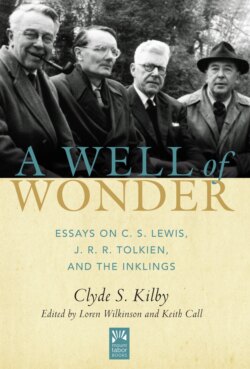Читать книгу A Well of Wonder - Clyde S. Kilby - Страница 15
На сайте Литреса книга снята с продажи.
LETTERS TO MALCOLM: CHIEFLY ON PRAYER
ОглавлениеThe rich conception of God as creative artist continues in the posthumous volume Letters to Malcolm: Chiefly on Prayer. In this book Lewis describes creation as a “delegation through and through” and argues that “there are no words not derived from the Word.” Life is, or ought to be, a continuous theophany. Every bush is a Burning Bush, and the world is “crowded with God.” Because sin defies not merely God’s law but his whole creative purpose, it is more than disobedience—it is sacrilege. No physiological or psychological explanation of humanity goes deep enough. Neither the “I” nor the object is ultimate reality, and we are deceived when we take them as such. One great value of prayer is that it forces us to leave the continually impinging secularism of life and awaken to “the smell of Deity” that hangs over it. In prayer, as in the Lord’s Supper, we take and eat. Understanding, desirable as it may be, is for the time replaced by a contact with ultimacy.
Our pleasures are “shafts of the glory as it strikes our sensibility.” What we call bad pleasures are actually those obtained by unlawful acts. “It is the stealing of the apple that is bad, not its sweetness. The sweetness is still a beam from the glory.” Lewis says that ever since he learned this long ago he has tried to make each pleasure of his life into a channel not simply of gratitude to God but of adoration. He thinks the difference is significant. “Gratitude exclaims, very properly, ‘How good of God to give me this.’ Adoration says, ‘What must be the quality of that Being whose far-off and momentary coruscations are like this!’ One’s mind runs back up the sunbeam to the sun.”
Lewis calls this book more nearly autobiography than theology and says that he has often simply “festooned” theological ideas with his reflections. Some years ago he wrote me that he had done a book on prayer but was not satisfied with it. That he still felt the tentative nature of some of his conclusions may be evident in the fact that he has put the book in the form of offhand letters to an old college friend.
Had we not known before, this volume would leave little doubt that A Grief Observed, the book that appeared under the name N. W. Clerk, is by Lewis, for here we find numerous poignant allusions to the “great blow,” i.e., the death of his wife, and the deep love he had for her. It also gives us the best glimpse anywhere into the practical aspect of Lewis’s prayer life. He had a lengthy list of people, some of whom he had prayed over for a long span of years and some of whom he knew simply as “that old man at Crewe” or “the waitress” or even “that man.”
In this book Lewis repeats the idea discussed in an appendix to Miracles that our prayers are granted, or not, before the beginning of time. In the initial act of creation God dovetailed all “future” spiritual and physical occurrences. Our difficulty in understanding this is that we experience in time the things that to God are outside time. The acts of men, whether prayer or sin, are not “predetermined,” for there is no “pre” with God. Because we cannot, like God, experience life in an “endless present,” it does not at all mean that we are not, living or dead, eternal in God’s eyes. Of a good act we may say with equal validity, “God did it” and “I did it.”
Lewis’s remark that he believes in Purgatory can best be understood in terms of his conviction that God continues his beatitudes in the soul after death, that there is a “farther in and a higher up” and that all eternity perhaps involves a growth. Like Dr. Johnson, Lewis thinks that the closer one comes to the purity of heaven the more he will wish for some preparation, some hallowing of the soul, before it takes up its new citizenship. Purgatory is for him a place not of retributive punishment but rather of purification in which the saved soul “at the very foot of the throne, begs to be taken away and cleansed.”
Then there is in this book the same profound sense of the reality of heaven that has permeated all of Lewis’s mature thinking. As usual, and with particular meaning in this his last book before his death, Lewis closes with a discussion of the Resurrection and the joy of heaven. He repeats that he came to believe in God before he believed in heaven and adds that even if the “impossible supposition” that there is no Resurrection were true, he would still take his stand on the side of Christianity. After his speculations concerning the nature of the resurrected body, he concludes that if he is incorrect something even better than he has imagined will be the Christian’s happy discovery at death.
